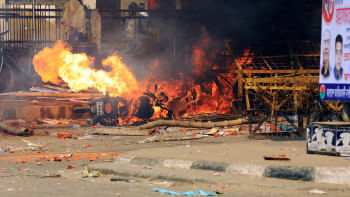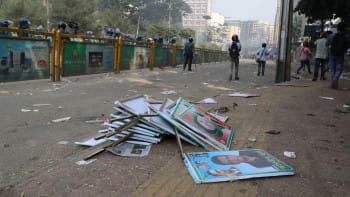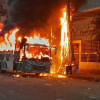Where do we go from here?

The script had been followed to the tee. Long before October 28, we heard leaders of the ruling party reiterating how the opposition was going to resume its usual "jalao porao" (carrying out arson) tactics, in reference to the 2014 incidents. They also vowed in public rallies how they would "protect" the public from such mayhem. Now, after images of violence have been circulating in mainstream and social media, violence that has left several people killed—including a policeman, Jubo Dal leader, and a conductor who was sleeping in a bus that was set on fire—as well as bloodied the faces of journalists and ruling party men beaten up by BNP activists, it seems that this round of the battle has been won by Awami League.
That there would be clashes and bloodshed was a forgone conclusion. The political rhetoric circulating in the last few weeks has been pointing to an escalation of hostility between the two major parties AL and BNP, with Jamaat chiming in to spice things up. While BNP has been steadfast in its demand that the government resign and that the elections be held under a caretaker government, AL has made it clear that they will do anything but that, with the ruling party's general secretary saying that the election-time government could only be headed by Sheikh Hasina. Thus, the possibility of coming to a compromise was actually zero. In fact, the quips of bringing sticks with flags on them and how "we will see how they stay in the alleyways" gave the impression that the characteristic brute force seen in the past would be used on the opposition.
But this did not happen the way it was anticipated, and it seemed AL had successfully created the apprehension of a ruthless clamp-down on BNP without the usual intensity.
So, on the face of it, BNP failed to keep its promise of holding peaceful rallies, and the ruling party apparently showed uncharacteristic restraint by concentrating more on celebrating the inauguration of the Bangabandhu tunnel over the Karnaphuli River. The optics were glaringly contrasted.
In Dhaka, the designated streets occupied by BNP looked like a battlefield, with opposition activists clashing with police, a fatally wounded policeman lying motionless among the debris, and buses being burnt to a crisp. In Chattogram, a beaming prime minister and jubilant AL supporters inaugurated the most impressive modern infrastructure the country has ever seen—a tunnel under a river, promising unprecedented economic benefits.
But before we draw decisive conclusions, let us examine the facts—or at least what we know and don't know.
According to reporters on the field, the BNP rally in Nayapaltan on October 28 began peacefully. But around 3pm, police approached from two sides, opened blank fire, and hurled sound grenades and tear gas as they reached the rally venue. The BNP men threw brickbats in response and thus, the rally was foiled. Before this, according to police, BNP activists stopped two pickup vehicles and a bus carrying ruling party activists near Kakrail mosque and vandalised the vehicles, which caused a clash to ensue and prompted the police to get into action. This escalated when more BNP activists rushed to the spot and started throwing brick chunks towards the police, leading to more clashes and chases and counterchases between BNP men and the law enforcers.
AL therefore had the perfect pretext to take a hardline against the BNP, after showing what it claims was their patience and restraint. This has led to the arrests of Mirza Fakhrul and other BNP leaders and activists, who have been slammed with numerous cases including the vandalism of the chief justice's house in Kakrail.
Let us not forget, however, the other bits that make up the backdrop of this drama.
The indiscriminate number of cases made against hundreds of BNP men long before October 28 (cases accusing leaders of the arson incidents of 2014), the counter "peace rallies" called on the same date as each BNP rally, the arrests of activists coming to attend rallies, police going through mobile phones of BNP members trying to attend rallies—these moves by the ruling party give us an idea of how determined it has been to thwart BNP at every level. The incidents of October 28, therefore, cannot be presented as being so simple as AL is promoting them to be, and are instead a culmination of the vitriolic politics of our country—wherein the ruling party yields all the power, and must carry the bigger burden of responsibility.
The incidents of October 28 and their aftermath, in addition, are mired in mystery and raise certain questions. What, for instance, was the police's role during the Jamaat rally at Shapla Chattar, which the government adamantly refused to give permission for but later relented, and which went on smoothly. Why were the police so lenient on Jamaat members who had declared they did not believe in any "man-made laws" and aimed to establish Sharia law in the country? Could the police have avoided breaking up the rally in Nayapaltan? Who were the "youths" on motorbikes wearing police vests who set fire to a bus in Kakrail? It is unlikely that there will be any objective government probe into unravelling these mysteries, since a status quo fits into the official narrative.
While reports have revealed that BNP men did beat up ruling party activists and journalists, and also injured law enforcers and vandalised vehicles, the instigators of other incidents of violence have not been unearthed.
In the wake of the announcement of BNP's "countrywide blockade" on October 31, and on November 1-2, with other parties joining in, and the government's heightened hardline against BNP, the possibility of more violence and political murkiness is all that the public can be certain of.
Aasha Mehreen Amin is joint editor of The Daily Star.
Follow The Daily Star Opinion on Facebook for the latest opinions, commentaries and analyses by experts and professionals. To contribute your article or letter to The Daily Star Opinion, see our guidelines for submission.

 For all latest news, follow The Daily Star's Google News channel.
For all latest news, follow The Daily Star's Google News channel. 









Comments